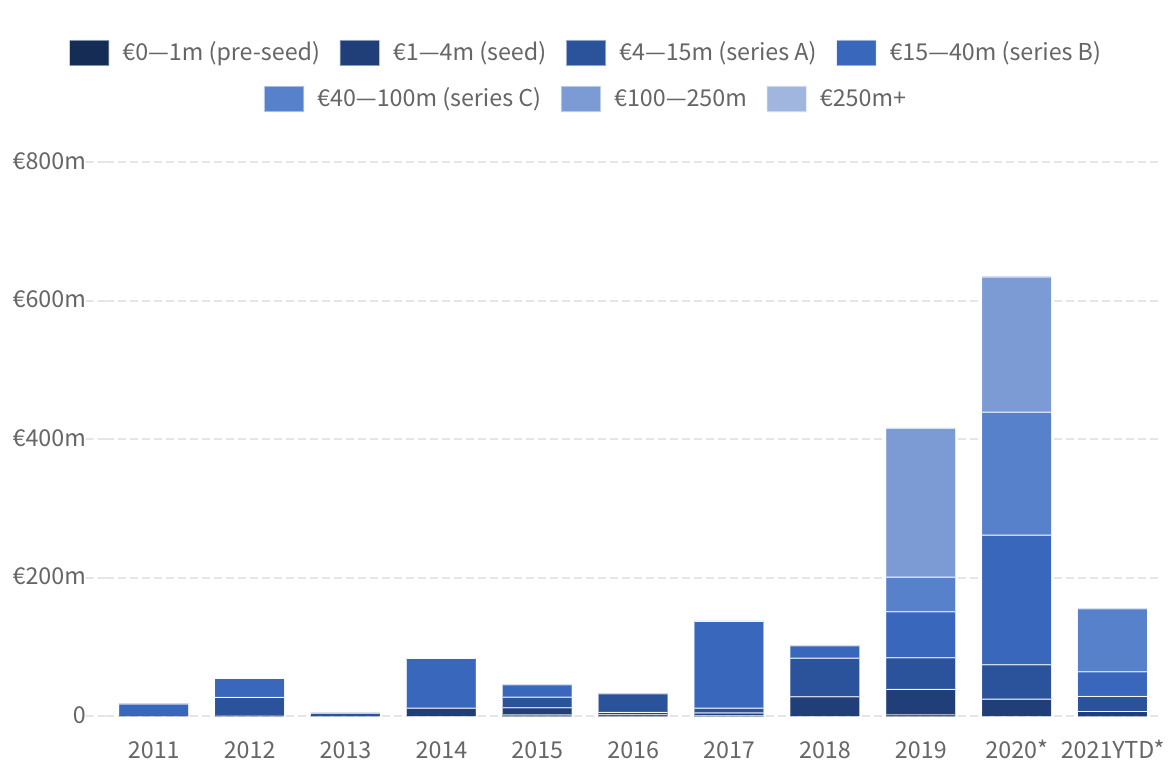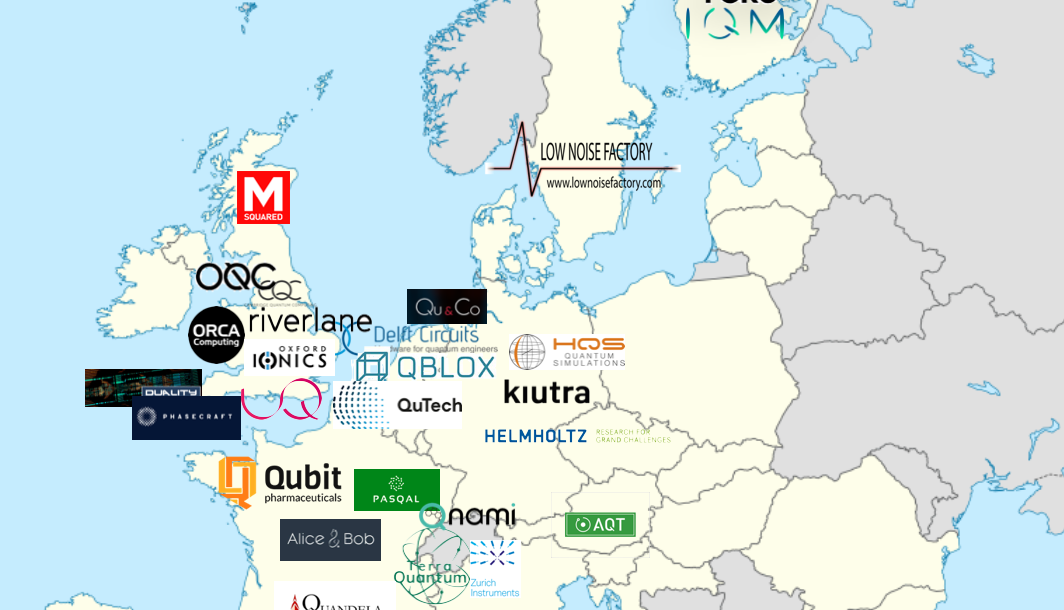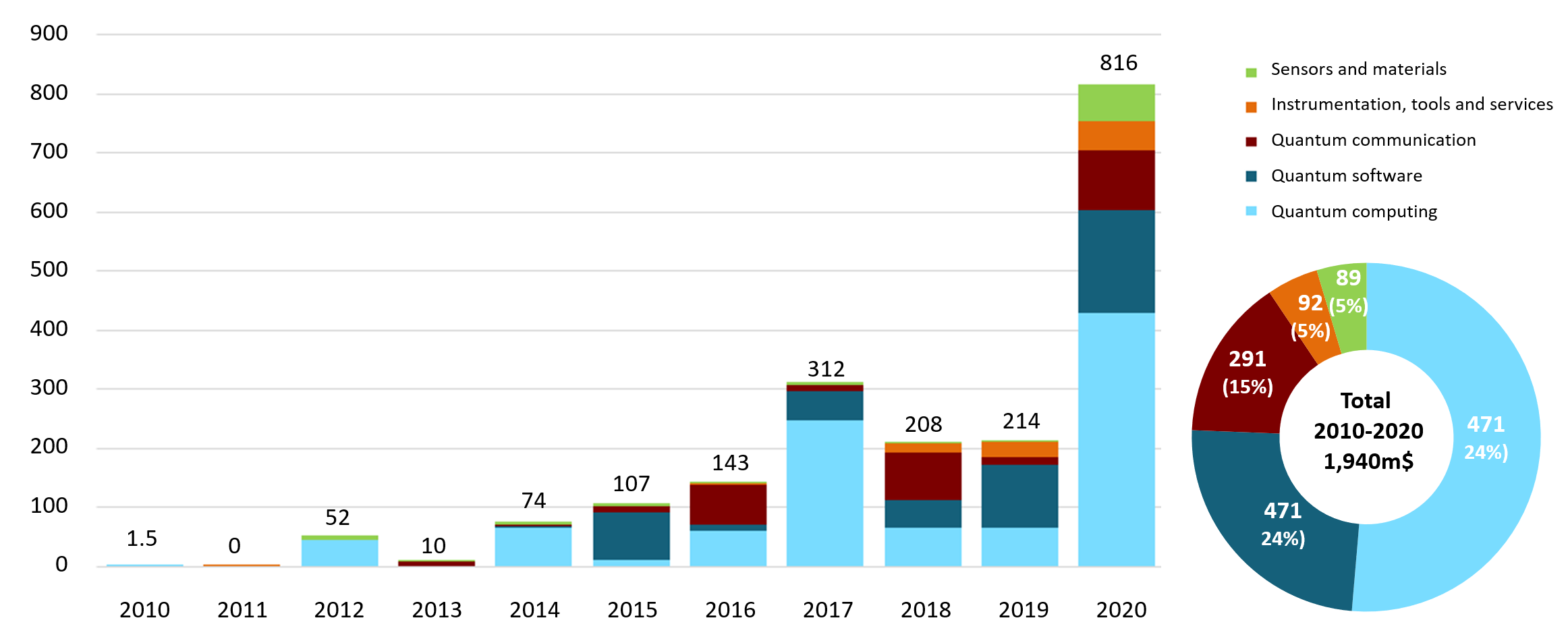“What are companies doing with quantum computing? Nothing of commercial value yet,” laughs Philipp Harbach, head of In Silico Research at Merck, when Sifted puts the question to him. “If someone tells you they are already using real quantum computing that is just a marketing exercise. Companies have just begun to explore this new technology and take it seriously.”
What are companies doing with quantum computing? Nothing of commercial value yet.
Harbach’s job is to evaluate emerging technologies for the pharmaceuticals company, and he is keen to find solutions that would help Merck speed up the discovery of new drugs or crunch through research and trial data faster. He’s been working with quantum computing companies SeeQC, HQS and Rahko to evaluate what quantum computing could do for them. So far the answer has been: not a lot.
In August last year, Google published a paper claiming that its Sycamore quantum processor had been able to simulate a chemical reaction, and Harbach was interested — could this be a breakthrough the company could use?
The results were not applicable to a real-life Merck problem yet. 'Noisy' or error-prone qubits were likely to erase any speed advantages. But Harbach was impressed and says it is an encouraging sign that quantum computers will have an impact on quantum chemistry in the future — once the error rates can be controlled.
A scramble to invest in quantum computing
Quantum computing is getting an increasing amount of VC investment. Last year quantum technology companies raised more than $635m, according to Dealroom, including a $215m funding round for PsyQuantum, which is developing silicon-based quantum computers and a $45m round for Cambridge Quantum Computing, developer of quantum computing software.

In March, US-based IonQ announced plans to list on the New York Stock Exchange via a merger with a special purpose acquisition company. The deal is worth $2bn, and if approved by the US Securities and Exchange Commission, IonQ would become the first publicly-listed quantum computing company.
With companies like Riverlane and Cambridge Quantum Computing rolling out quantum computing software, many in the industry claim quantum computing is getting to the point where it will become useful for companies.
33% of large enterprises are investigating quantum computing applications.
According to a recent study by Seeqc, some 33% of large enterprises are investigating quantum computing applications — it was the fourth most popular area of deeptech investment.
“It is part of every CTO’s portfolio of exploratory technologies they are looking into,” says Oliver Graham-Yooll, deeptech commercialisation partner at SIA Partners, the management consultancy. “Companies know that there will be winners and losers in this and if they are not ready when the technology arrives, they will be on the wrong side of that.”
A number of companies have established quantum computing task forces. Spanish bank BBVA set up six projects in 2019 to study the applications of quantum computing for the financial services sector. This included investigating whether quantum computing could speed up optimising an investment portfolio. This becomes a slow and complex task for a classical computer when there are more than 100 different variables to calculate.
BMW set up a project team in 2018 to conduct feasibility studies on quantum computers, working with QCWare, a Palo Alto-based company developing hardware-agnostic quantum computing software for large enterprises. BMW envisioned using quantum computing to speed up complex calculations, such as optimising car production lines and simulating the way materials would behave under different conditions.
Quantum computing is potentially useful for any problem that requires huge computation power — anything with a large number of variables that need to be calculated quickly.
Massive Analytic, a machine learning company is combining quantum computing and AI to create quantum neural networks, capable of calculating in real time, for example, whether it is safe for a self-driving car to change lanes on a motorway. It is working with at least one automotive OEM to test out the concept.
Massive Analytic also believes a combined quantum and AI system would be useful in healthtech, for example for tracking the progression of Alzheimer’s’ disease in the brain,
”Analysing a classical point cloud of the human brain's surface is a very computer processor intensive activity. To record the brain surface clearly, such a point cloud will have millions or even hundreds of millions of points. As a result, classical computers often crash when operating a point cloud of the human brain with very great detail,” says George Frangou, Massive Analytics founder and CEO.
Still 10 years away from being useful
But early exploration has left many of the corporate quantum pioneers pretty sceptical.
“Our use cases were not able to show an immediate practical value,” a BMW spokesman told Sifted. “Our experts anticipate that it will take some more years until real quantum computers can be used for commercial benefit.”
A lot of investors are betting on a commercial quantum computer becoming available in three years — but what if that doesn’t happen?
“A lot of investors are betting on a commercial quantum computer becoming available in three years — but what if that doesn’t happen?” says Harbach. “It’s extremely hard to predict when a quantum computer will become usable.”
The first commercially useful quantum computing applications are likely to arrive in the latter half of the 2020s, says Thierry Botter, head of Airbus Blue Sky. And the first useful applications of quantum computing will be narrow and apply to specific business segments — a widespread switch over to quantum computing will require more time and more successes of quantum machines.
“The problem is that quantum has been forced out of the proof of concept stage faster than it should have been by all the hype,” says SIA’s Graham-Yooll. “It’s not as if we have fully functional quantum computers in university laboratories and we just haven’t applied them yet to a commercial problem. The tech just hasn’t been cracked yet.”
Applying quantum to industry problems
Like Harbach, Botter has spent time evaluating quantum technologies, as part of Airbus’s Blue Sky unit, a small team, set up in 2017 which would explore emerging technologies like synthetic biology and neuroscience. Botter also worked with QCWare, to see what was possible to do with quantum computers.
Botter tried to apply the technology to a classic engineering problem — a fault-tree analysis that tries to understand what combinations of small, low-level failures in an engineering structure might result in a bigger problem.
The quantum systems were too small to handle the problem for Airbus but the solutions were promising.
“It was a low-hanging fruit problem and one where we believed quantum computing could provide a speedup,” says Botter. “The results were interesting,” he says. “The quantum systems were too small to handle the problem for Airbus but the solutions were promising. There was a potential of getting faster solutions — not necessarily better but faster.”
Next Airbus set up a quantum challenge in January 2019, asking quantum companies and researchers to propose solutions to five problems specific to the airline industry. They received 36 proposals. The winning one was from Italian consulting company Machine Learning Reply, which proposed using quantum computing to calculate the optimum way of loading cargo onto a plane. Calculating optimum loading is a complex combinatorial problem that classical computers struggle with, as several different factors such as weight, price, centre of gravity, volume and shear limits all need to be considered.
This solution is not planned for near-term commercial deployment, but Botter sees the exercise as an important learning experience.
“It helped clarify thinking internally,” he says. “We’ve had a desire to engage with this early and we are convinced of its future potential.”
What types of quantum computing are companies betting on?
The fact that it is not yet clear which type of quantum computing hardware will work best — superconducting qubits (made by IBM, Google and Rigetti), trapped ion-based qubits (from IonQ and Honeywell) and not to mention a dozen others — is one of the biggest roadblocks for many companies.
Some, like BMW, use quantum computing-as-a-service, offered by companies like IBM, Google and AWS. This means they don’t have to commit to owning or running any of the hardware and can test out several types of quantum computer with minimum hassle.
Many, like Airbus, are still agnostic on which technology to use and keen to try all of them. Botter says it is possible that several types of quantum computer would exist in the future, each adapted to a different type of problem.
Winter is coming
That future isn’t coming as fast as current quantum hype would suggest, however, and both Botter and Harbach are worried that quantum companies are heading for a winter of disillusionment.
“Quantum computing is in a hype spring, not even in summer yet.” says Harbach.
There has been a rapid increase in the level of interest in quantum computing. [It] has brought about some unrealistic expectations.
Botter agrees: "There has been a rapid increase in the level of interest in quantum computing. This has helped the sector further accelerate its growth but has also brought about some unrealistic expectations,” he says. “Quantum computers hold immense potential for high-end computing applications in the future. However, the field is still young and much more work is needed to mature the technology to commercial readiness. It’s important to remain level-headed when formulating near-term expectations of the technology.”
Harbach says it can be frustrating to work with venture-backed quantum computing companies who are keen to sell solutions to business problems when the technology simply isn’t ready yet.
“I like collaborating with startups that are honest and open-minded and admit that they may not have a ready-to-use product for us yet. They partner with us to explore and assess the technology,” he says.
Merck has a long-standing collaboration with SeeQC, a New York-based startup developing digital quantum computing in which Merck’s venture capital arm, M Ventures, invested $5m in April 2020. They are also exploring explore quantum chemistry applications with HQS Quantum Simulations.
“Everywhere you read we need quantum computing for drug discovery, for material science but not many actually know what that actually means. Even we as a science and technology company being active in both areas first have to explore the possibilities and benefits of quantum computing.”
As a first step, says Harbach, Merck is looking for cases where a quantum computer can solve a particular business problem substantially faster than the way the company solves it now. He’s looking for a saving in time or cost. “That’s what we need to find out and I’m looking forward to it,” he says.



